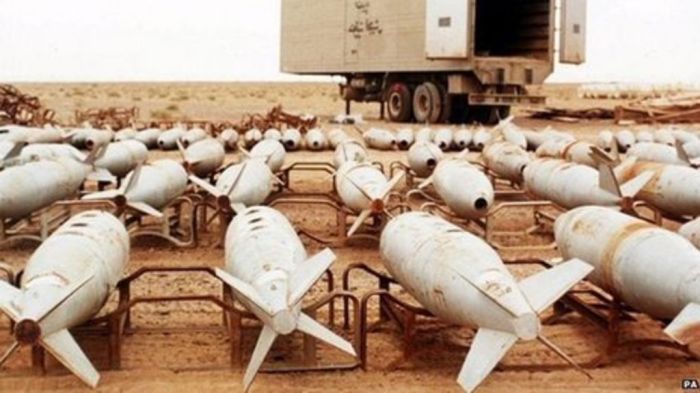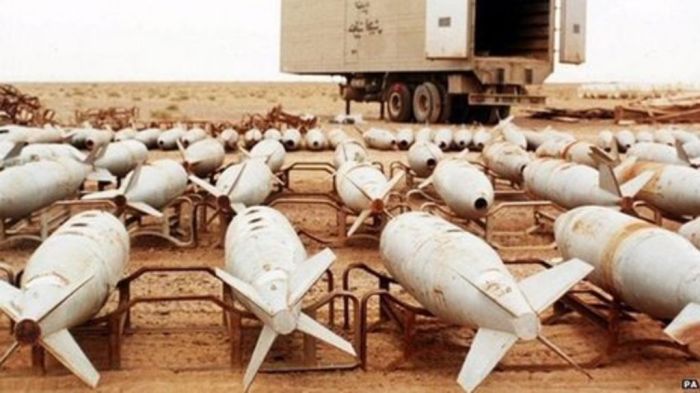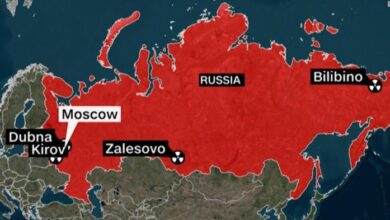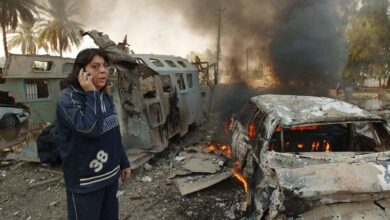
Iraq and Weapons of Mass Destruction: A Controversial History
Iraq and weapons of mass destruction, a phrase that evokes strong emotions and a complex history. The 2003 invasion of Iraq, justified by claims of WMDs, remains a defining moment in international politics, sparking debates about intelligence, diplomacy, and the consequences of war.
The story of Iraq’s WMD program is intertwined with international concerns about proliferation, the rise of powerful nations, and the struggle for global security.
From the early days of Saddam Hussein’s regime, Iraq’s pursuit of WMDs raised anxieties within the international community. The 1991 Gulf War and subsequent sanctions aimed to dismantle Iraq’s WMD program, but suspicions lingered. The Bush administration, citing intelligence reports of Iraq’s ongoing WMD development, launched the 2003 invasion, setting off a chain of events with profound and lasting consequences.
Historical Context
The history of Iraq’s weapons programs is a complex and multifaceted one, marked by periods of development, international scrutiny, and ultimately, the 2003 invasion. Understanding this historical context is crucial to comprehending the events that led to the war and its aftermath.
Development of Iraq’s Weapons Programs
Iraq’s development of weapons of mass destruction (WMD) programs can be traced back to the 1960s, with the rise of Saddam Hussein to power. Driven by a desire for regional dominance and a sense of insecurity, Hussein’s regime invested heavily in developing chemical, biological, and nuclear weapons.
- 1960s-1970s:Iraq began developing chemical weapons programs, acquiring expertise and technology from various sources, including Germany and France. They also started exploring nuclear weapons capabilities, seeking to enrich uranium.
- 1980-1988:During the Iran-Iraq War, Iraq extensively used chemical weapons against Iranian troops and civilians, marking a significant escalation in its WMD program. This period also saw Iraq’s pursuit of nuclear weapons development accelerate, with the construction of a nuclear reactor at Osirak.
- 1991:Following the Gulf War, the United Nations Security Council imposed strict sanctions on Iraq, requiring the complete dismantling of its WMD programs and related infrastructure. This period saw the destruction of the Osirak reactor and the removal of key components of Iraq’s chemical weapons program.
- 1990s:Despite the sanctions, Iraq continued to develop its WMD programs covertly, hiding and concealing its activities from international inspectors. This resulted in a period of intense scrutiny and suspicion from the international community.
International Concerns Regarding Iraq’s WMD Capabilities
In the years leading up to the 2003 invasion, the international community expressed significant concerns regarding Iraq’s potential WMD capabilities. The United States, in particular, argued that Iraq posed a serious threat to regional and global security due to its alleged WMD program and its potential to share such weapons with terrorist groups.
- 1998:The United States and the United Kingdom launched airstrikes against Iraq, citing its failure to comply with UN Security Council resolutions related to WMD inspections. This event further escalated tensions and heightened international concerns.
- 2002:The Bush administration, citing intelligence reports that Iraq was actively developing WMDs and seeking to acquire nuclear weapons, made the case for military action. The administration argued that Iraq’s WMD programs posed an imminent threat to the United States and its allies.
International Agreements and Treaties Related to WMD Proliferation
The development of Iraq’s WMD programs occurred against the backdrop of international agreements and treaties designed to prevent the proliferation of such weapons. Iraq’s actions, or lack thereof, played a significant role in influencing these agreements.
- Treaty on the Non-Proliferation of Nuclear Weapons (NPT):Iraq signed the NPT in 1968, but its actions in developing nuclear weapons programs raised questions about its commitment to the treaty. The NPT aims to prevent the spread of nuclear weapons and weapons technology, promote cooperation in the peaceful uses of nuclear energy, and work towards the ultimate goal of nuclear disarmament.
- Chemical Weapons Convention (CWC):Iraq signed the CWC in 1993, committing to destroying its chemical weapons stockpiles and production facilities. However, Iraq’s failure to fully comply with the CWC’s provisions fueled concerns about its commitment to international agreements.
- Biological Weapons Convention (BWC):Iraq signed the BWC in 1972, but its development of biological weapons programs raised questions about its adherence to the treaty. The BWC aims to prevent the development, production, and stockpiling of biological weapons, and to promote cooperation in the peaceful uses of biological science.
The 2003 Invasion and Subsequent Developments
The 2003 invasion of Iraq, led by the United States and its allies, was a pivotal moment in the country’s history and had far-reaching consequences. The invasion was justified by the Bush administration based on intelligence assessments that claimed Iraq possessed weapons of mass destruction (WMDs) and was linked to al-Qaeda.
However, these claims were later found to be inaccurate. The invasion triggered a complex and turbulent period in Iraq, marked by a protracted insurgency, sectarian violence, and the rise of powerful political factions.
Intelligence Assessments and Justifications for the Invasion
The decision to invade Iraq was based on intelligence assessments that claimed the country possessed WMDs and posed a threat to the United States and its allies. The Bush administration presented a series of justifications for the invasion, arguing that Iraq was in violation of United Nations Security Council resolutions, was developing WMDs, and had ties to terrorist groups.
- The “mushroom cloud” threat:The administration argued that Iraq was actively developing WMDs, including chemical and biological weapons, and potentially nuclear weapons, posing a significant threat to regional and global security.
- The “link to al-Qaeda”:The administration claimed that Iraq had connections to al-Qaeda, the terrorist group responsible for the 9/11 attacks, and was providing support to terrorists. This claim was later found to be unsubstantiated.
- The “failure to comply with UN resolutions”:The administration argued that Iraq had failed to comply with UN Security Council resolutions demanding the disarmament of its WMD programs.
These claims were based on a combination of intelligence reports, public statements by Iraqi officials, and the administration’s own interpretations of the available evidence. However, many of these claims were later found to be flawed or exaggerated, leading to accusations of intelligence failures and manipulation of evidence.
The Iraq War, fueled by claims of weapons of mass destruction, had devastating consequences for the Iraqi people. While the initial focus was on the threat of WMDs, the reality is that the conflict itself contributed to widespread poverty, leaving many Iraqis struggling to access basic necessities.
This highlights a crucial connection between conflict and hunger, a connection that’s often overlooked. The root causes of hunger are often intertwined with poverty, as explained in this insightful article on causes of hunger are related to poverty.
The long-term impact of the Iraq War on the country’s food security serves as a stark reminder of the devastating consequences of war, especially for the most vulnerable populations.
The Post-Invasion Search for WMDs, Iraq and weapons of mass destruction
Following the invasion, the United States and its allies launched a massive search for WMDs in Iraq. This effort involved extensive inspections, intelligence gathering, and the interrogation of Iraqi officials. However, despite the significant resources dedicated to the search, no conclusive evidence of WMDs was ever found.
- The Downing Street Memo:In 2005, a leaked memo from the British Prime Minister’s office revealed that the Bush administration had already decided to invade Iraq in 2002, before the intelligence community had concluded that Iraq posed an imminent threat. This memo raised serious questions about the integrity of the intelligence assessments used to justify the invasion.
- The Duelfer Report:In 2004, the United States government released the Duelfer Report, which was the culmination of a year-long investigation into Iraq’s WMD program. The report concluded that Iraq had no active WMD programs at the time of the invasion and had not developed any new WMDs since the end of the first Gulf War in 1991.
The failure to find WMDs in Iraq had a profound impact on the public’s perception of the invasion. It undermined the Bush administration’s justification for the war and contributed to a growing sense of disillusionment and anger.
The Impact of the Invasion on Iraq’s Political Landscape, Security Situation, and WMD Programs
The invasion of Iraq had a devastating impact on the country’s political landscape, security situation, and the development of WMD programs.
- The Rise of Sectarian Violence:The invasion led to the collapse of the Iraqi state and the emergence of a power vacuum. This vacuum was quickly filled by sectarian militias, who engaged in widespread violence and persecution. The sectarian violence reached its peak in 2006 and 2007, with the country on the brink of civil war.
- The Insurgency:The invasion also triggered a protracted insurgency, led by groups like al-Qaeda in Iraq and the Mahdi Army. The insurgency targeted both Iraqi and coalition forces, as well as civilians, and contributed to the instability and violence in the country.
- The Development of WMD Programs:While Iraq did not have active WMD programs at the time of the invasion, the invasion itself had a significant impact on the country’s potential to develop WMDs in the future. The destruction of Iraq’s infrastructure, the loss of skilled scientists and engineers, and the chaos and instability that followed the invasion made it difficult for Iraq to develop WMDs.
However, the invasion also created opportunities for other countries and groups to acquire sensitive technology and expertise, potentially increasing the risk of WMD proliferation in the region.
The invasion of Iraq was a complex and controversial event with lasting consequences for the country and the world. The failure to find WMDs, the rise of sectarian violence, and the emergence of a powerful insurgency have left Iraq in a fragile and unstable state.
The invasion also had a significant impact on the international community, raising questions about the legitimacy of preemptive military action and the role of intelligence in foreign policy decision-making.
International Response and Diplomacy: Iraq And Weapons Of Mass Destruction
The 2003 invasion of Iraq sparked a wave of international reactions, ranging from staunch support to fierce opposition. The decision to go to war without a clear UN mandate and the subsequent failure to find WMDs raised serious questions about the legitimacy of the invasion and the credibility of the intelligence that led to it.
The United Nations Security Council and International Organizations
The UN Security Council played a pivotal role in the lead-up to the invasion. Despite the US and UK’s efforts to secure a resolution authorizing the use of force, France, Russia, and China opposed it. This failure to obtain a UN mandate was a significant factor in the international backlash against the invasion.
“The Security Council is the body that has primary responsibility for the maintenance of international peace and security.”
UN Charter, Article 24
The Iraq War, fueled by the controversial claim of Iraq possessing weapons of mass destruction, remains a defining moment in recent history. This conflict, however, is just one piece of a larger puzzle – the complex and multifaceted Middle East conflict.
To truly understand the intricacies of this region, it’s crucial to delve deeper into the historical context, exploring the various factors that have shaped the region’s dynamics, which you can learn more about in this brief background on the Middle East conflict.
Ultimately, the Iraq War, with its focus on weapons of mass destruction, serves as a stark reminder of the complexities and interconnectedness of events in the Middle East.
Other international organizations, such as the International Atomic Energy Agency (IAEA), also played a role in the WMD issue. The IAEA conducted inspections in Iraq in the years leading up to the invasion, but these inspections were ultimately deemed insufficient by the US and UK.
Diplomatic Efforts to Resolve the WMD Issue
Prior to the invasion, the US and UK pursued a number of diplomatic avenues to address the WMD issue in Iraq. These efforts included:
- Negotiations with Iraq:The US and UK attempted to negotiate with the Iraqi government to comply with UN Security Council resolutions demanding the disarmament of WMDs. These negotiations proved unsuccessful.
- Sanctions:The UN imposed a series of sanctions on Iraq in the aftermath of the 1991 Gulf War, aimed at pressuring the Iraqi government to disarm. These sanctions had a devastating impact on the Iraqi population and economy.
- Military Threats:The US and UK made numerous threats of military action against Iraq if it did not comply with UN demands. These threats ultimately led to the 2003 invasion.
The Legacy of the WMD Controversy
The Iraq WMD controversy, despite the absence of any significant WMDs being found, has left a lasting impact on Iraq, international relations, and the global perception of WMDs. This legacy extends beyond the immediate consequences of the 2003 invasion, influencing subsequent political and economic developments, shaping international diplomacy, and raising crucial questions about intelligence gathering and the use of force.
Impact on Iraq’s Political and Economic Stability
The 2003 invasion and the subsequent occupation of Iraq led to a period of instability and violence. The controversy surrounding WMDs contributed to a loss of trust in the Iraqi government, both domestically and internationally. This, in turn, hampered efforts to rebuild the country and establish a stable political system.
The war also severely damaged Iraq’s infrastructure and economy, leaving the country dependent on foreign aid and vulnerable to corruption. The lack of a functioning economy and the ongoing security challenges have contributed to a sense of disillusionment among the Iraqi people, further undermining political stability.
The Role of the Media
The media played a pivotal role in shaping public opinion regarding the WMD controversy in Iraq. The way intelligence assessments were reported, the impact of sensationalized coverage, and the challenges faced by journalists all contributed to the public’s understanding of the situation.
The Influence of Media Coverage on Public Opinion
The media’s reporting on intelligence assessments had a significant impact on public opinion. In the lead-up to the 2003 invasion, many media outlets presented intelligence reports suggesting that Iraq possessed WMDs as fact, without fully exploring the uncertainties and disagreements within the intelligence community.
This contributed to a widespread belief among the public that Iraq posed an imminent threat. For example, the infamous “16 words” in President Bush’s 2003 State of the Union address, which claimed that Iraq was seeking uranium from Niger, were widely reported by the media.
This claim, later found to be based on forged documents, further fueled public support for the invasion.
The Iraq War, fueled by the controversial claim of weapons of mass destruction, serves as a stark example of the dangers of unchecked power and the influence of ideology. The war was justified through a lens of national security, but its roots lie deeper, entangled with the principles of neoliberalism, a philosophy that prioritizes free markets and minimal government intervention.
To truly understand the complexities of the Iraq War, it’s crucial to delve into a primer on neoliberalism , a philosophy that played a significant role in shaping the geopolitical landscape leading up to the conflict.
Challenges Faced by Journalists
Journalists faced several challenges in covering the WMD issue. One major challenge was access to information. The Bush administration was highly secretive about its intelligence assessments, making it difficult for journalists to obtain independent verification of the information they were reporting.
Another challenge was the complexity of intelligence analysis. Intelligence assessments are often based on incomplete or ambiguous information, making it difficult to draw definitive conclusions. Journalists, who are accustomed to reporting on concrete facts, often struggled to convey the uncertainties inherent in intelligence analysis.
The potential for misinformation also posed a significant challenge. In the highly charged atmosphere surrounding the WMD controversy, there was a constant risk of reporting on false or misleading information.
Examples of Media Coverage that Influenced Public Discourse
Several examples of media coverage illustrate the influence of the media on public discourse and policy decisions related to WMDs in Iraq. * The reporting of the “16 words”mentioned earlier is a prime example of how media coverage can shape public opinion. The widespread reporting of this claim, despite its later debunking, contributed to public support for the invasion.
The use of “embedded” journalistsduring the 2003 invasion also had a significant impact on public discourse. Embedded journalists, who were allowed to travel with military units, provided firsthand accounts of the war, which often painted a favorable picture of the US military’s progress. This coverage helped to bolster public support for the war in its early stages.
The Impact on the Middle East

The controversy surrounding Iraq’s alleged weapons of mass destruction (WMD) had profound and lasting implications for the Middle East, far beyond the immediate consequences of the 2003 invasion. The region’s political landscape, security dynamics, and even the potential for WMD proliferation were all significantly impacted by the events surrounding the WMD claims.
The Regional Security Landscape
The Iraq War and the subsequent instability in the country created a power vacuum that fueled regional rivalries and sectarian tensions. The war also destabilized the broader Middle East, contributing to the rise of extremist groups like ISIS and increasing the risk of regional conflict.
The perception of the US as an unreliable partner in the region, particularly after the withdrawal of troops in 2011, further complicated regional security dynamics.
Ethical Considerations
The Iraq WMD controversy raises profound ethical concerns, particularly regarding the use of intelligence information and the potential for manipulation. The issue goes beyond the immediate consequences of the 2003 invasion; it delves into the fundamental principles of truth, accountability, and the justification of military action.
The Use of Intelligence Information and Potential Manipulation
The manipulation of intelligence information for political gain poses a significant ethical challenge. In the case of Iraq, the Bush administration presented intelligence suggesting that Iraq possessed WMDs and was actively pursuing their development, justifying the invasion. However, subsequent investigations revealed that this intelligence was flawed and, in some cases, deliberately manipulated.
The use of intelligence information to justify military action without rigorous scrutiny and transparency can lead to catastrophic consequences.
The Responsibility of Governments and International Organizations
Governments and international organizations bear the responsibility for ensuring the accuracy and reliability of intelligence assessments. This responsibility extends to both the collection and analysis of intelligence. They must establish robust mechanisms for evaluating the credibility of sources, verifying information, and considering alternative perspectives.
Additionally, they must be transparent about the intelligence they rely upon, allowing for independent scrutiny and accountability.
Ethical Dilemmas Surrounding the Use of Military Force
The use of military force in response to perceived WMD threats raises complex ethical dilemmas. The potential for catastrophic consequences, the loss of innocent lives, and the long-term repercussions of military intervention all demand careful consideration. The principle of proportionality, which dictates that the use of force should be proportionate to the threat posed, becomes particularly relevant in this context.
The ethical justification for military action must be grounded in clear evidence of a credible and imminent threat, leaving no room for miscalculation or manipulation.






